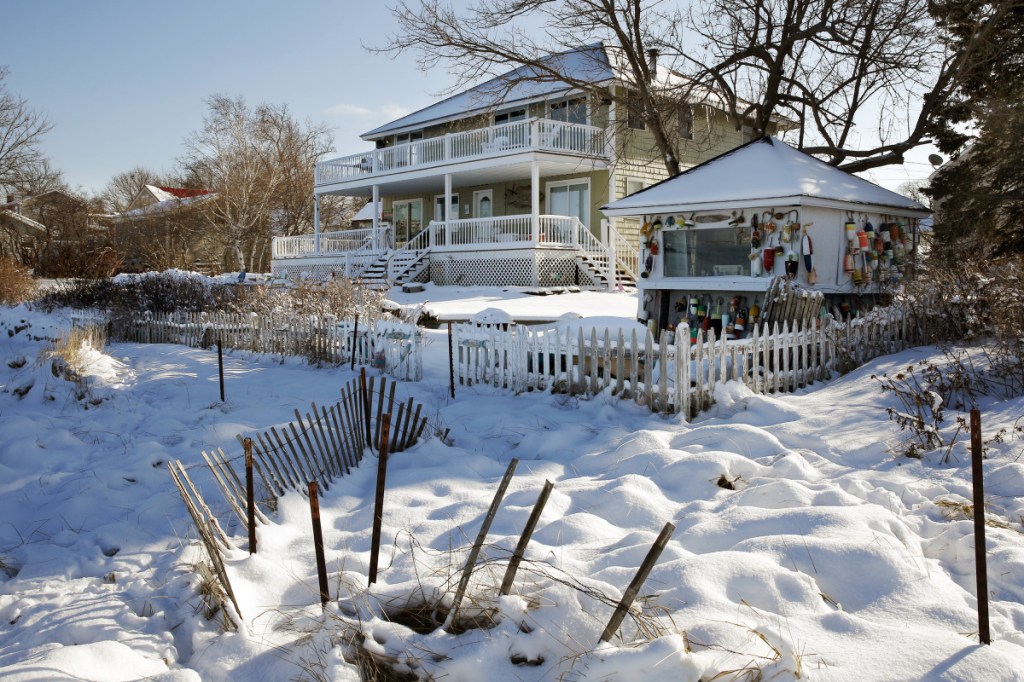SOUTH PORTLAND — The City Council unanimously repealed divisive new short-term rental regulations with overwhelming support from residents at Tuesday night’s meeting.
At the center of the disputed regulations is a ban on unhosted stays in residential neighborhoods that councilors said was intended to stop people from buying and converting single-family homes into whole-house rentals.
Following a resident’s successful petition drive, the council had a basic choice Tuesday to either repeal the controversial rules approved in February or send them to a referendum.
“Clearly there is more work to do and the council can learn from the critique of the public,” said Councilor Claude Morgan after the vote. “I think we can make some significant improvements.”
Morgan, who represents waterfront districts where short-term rentals have flourished, said the council will likely revisit a two-guest limit on hosted stays and zoning language that appears to limit home occupations. The council plans to make changes at a workshop to be held in the next few weeks.
There are 282 short-term rentals in South Portland offered on websites such as Airbnb and HomeAway, according to a recent count by Host Compliance, a third-party web service. About 200 of them are single-family homes that allow travelers to rent a whole house or apartment for a few days or weeks.
South Portland is one of the latest U.S. cities to deal with the spread of short-term rentals, along with neighboring Portland and Cape Elizabeth. The city’s outright ban on unhosted stays was the most restrictive so far in Greater Portland.
The ordinance was written to protect residential neighborhoods “from the nuisance impacts that are often associated with short-term rentals” and “to prevent long-term rentals from being replaced with short-term rentals.”
The ordinance allowed owner-occupied or “hosted home stays” throughout the city, but it banned from all residential zones any “non-hosted home stays” that don’t have an owner on the premises.
All short-term rentals also had to be registered, inspected, insured and subject to fines and possible closure if they didn’t follow the rules.
Preble Street resident Michael Frabotta and fellow petitioners collected 1,289 valid signatures of registered voters in an effort to force the council to reconsider its Feb. 20 approval of the regulations. That was well over the 1,000 needed to suspend the new rules from taking effect and require the council to either overturn its 6-1 vote or hold a referendum on the regulations at an upcoming election.
Opponents of the regulations said they wanted to protect landowners’ rights and are fighting for a better municipal review process. The council held four workshops and a total of six public hearings before passing the regulations.
Supporters said they wanted to preserve affordable housing and protect neighborhoods from being overtaken by commercial home rentals that they describe as mini-hotels.
On Tuesday, at the council’s seventh public hearing on the issue, residents on both sides appeared united in thinking that sending the regulations to referendum would only deepen animosity.
All but one of about 30 speakers said they favored either repealing the rules or trusting councilors to decide if repealing was the best course of action.
“In no way has this been rushed through,” said Diane Romano of Simonton Street, who supported the regulations. “(The process) has not been one-sided at all. If repealing it will make it better, (then) I’m in favor of you repealing it and making some small changes.”
Opponents of the new rules urged the council to establish a committee of stakeholders to seek “compromise” and develop “reasonable” regulations.
“I implore the council to go back to square one,” said Tony Ickes of Willard Haven Road. “If you send this to referendum, the division in the community is only going to get worse.”
Councilor Kate Lewis was the only councilor to speak on the issue before the 6-0 vote, with Councilor Eben Rose absent. Lewis said she opposed going to referendum because it would attract “corporate” campaign dollars from short-term rental websites.
Lewis and other councilors also indicated after the meeting that they still wouldn’t support establishing an ad-hoc committee because they believe it would intensify community division.
Other U.S. cities, including New York and Nashville, have banned or severely restricted unhosted home rentals, although the crackdowns have proved difficult to enforce. A recently released study by McGill University researchers concluded that most short-term rentals in New York are illegal and that the practice has fueled a housing shortage and rent increases.
Cape Elizabeth adopted a permitting process for short-term rentals in 2012 that allows the town to revoke the permit if the property is the subject of three complaints within three years.
Portland passed a more involved registration process last April that caps the number of non-owner-occupied rentals citywide at 300.
Kelley Bouchard can be contacted at 791-6328 or at:
kbouchard@pressherald.com
Twitter: KelleyBouchard
Send questions/comments to the editors.


